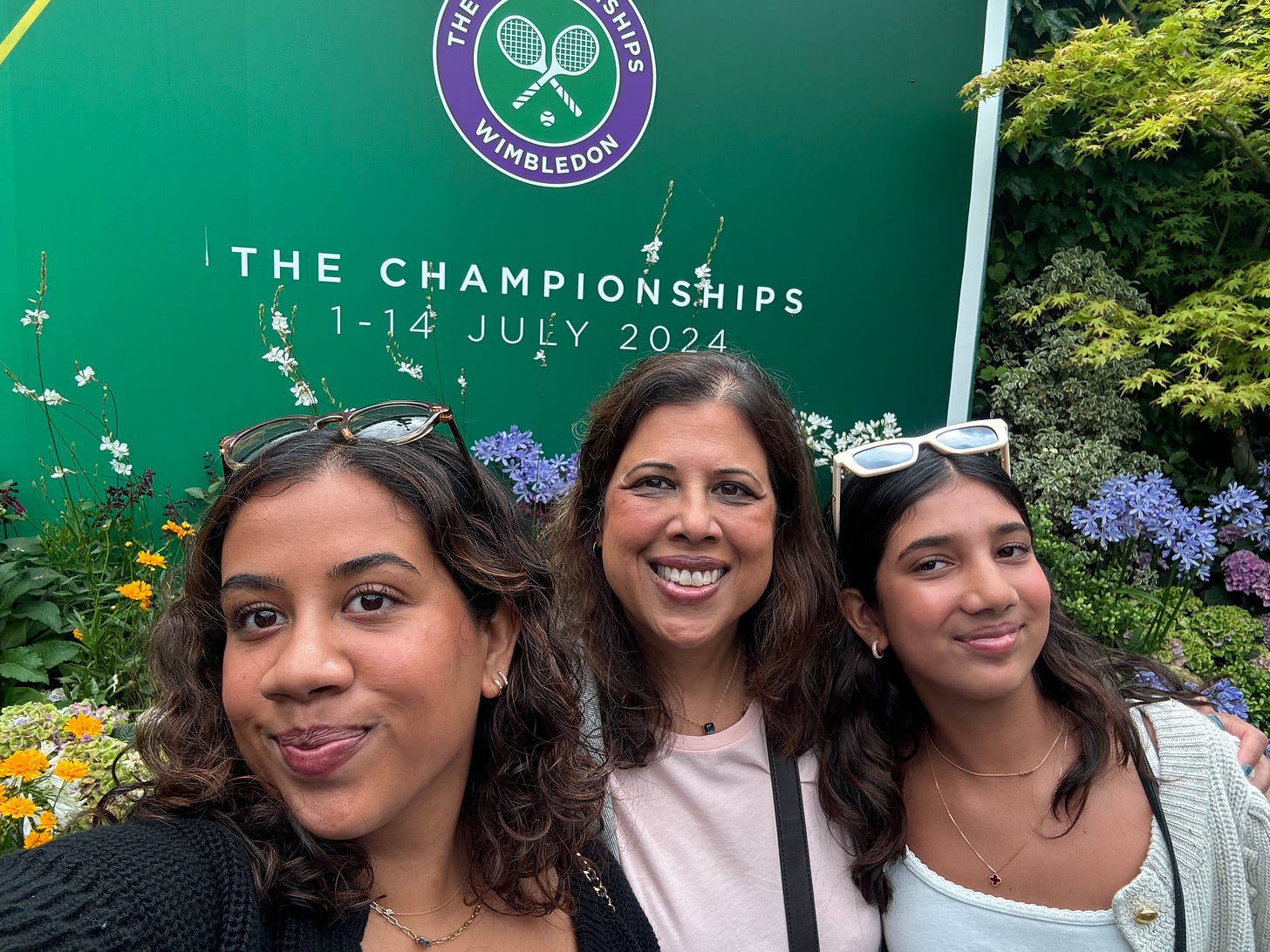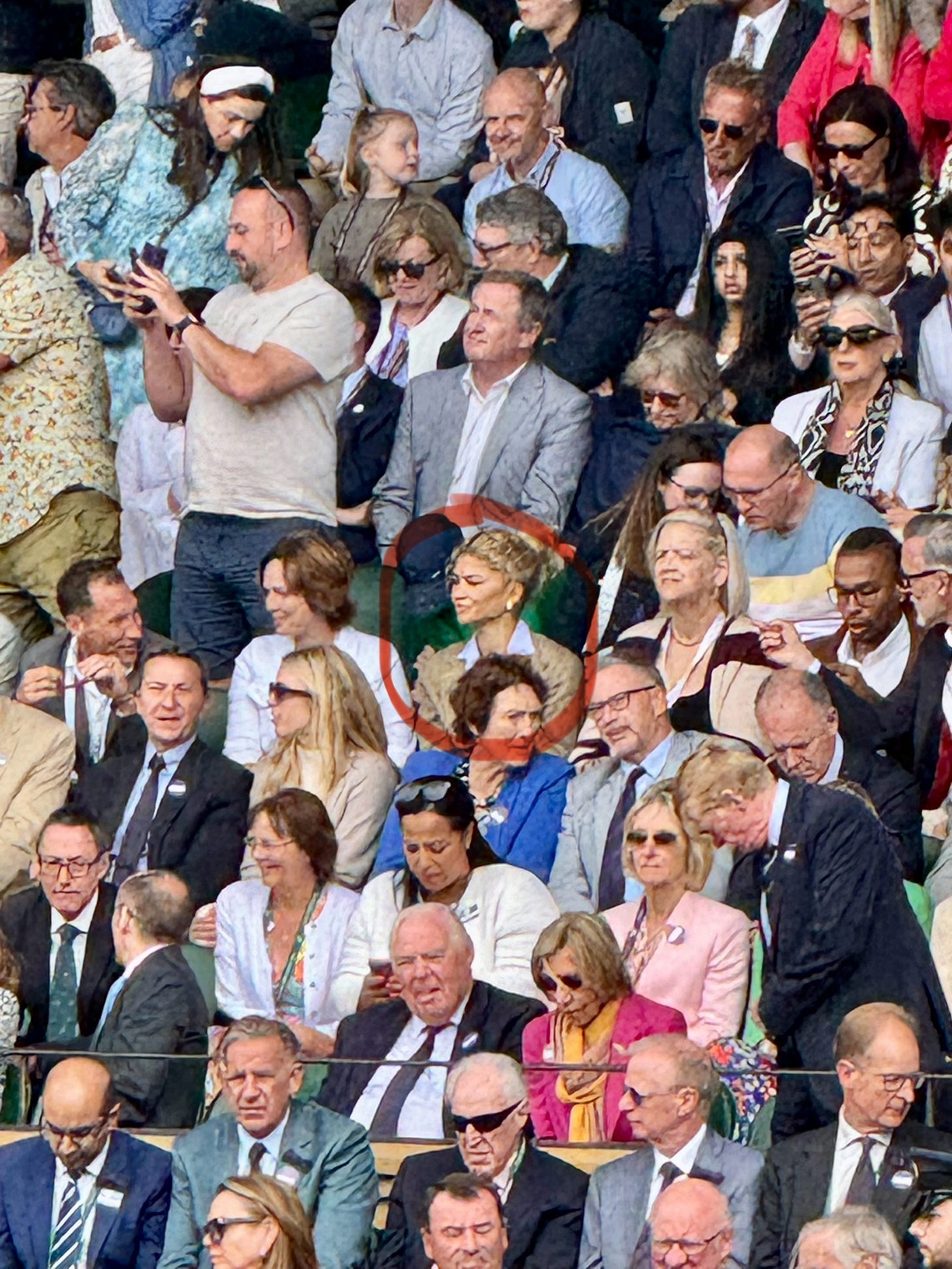DISPATCH FROM WIMBLEDON AND LOOKING FOR LOVE IN ALL THE WRONG PLACES
P.S.: THIS IS NOT A TRAVEL BLOG
TENNIS, HEART, A DELICIOUS COCKTAIL AND BREAKFAST AT TIFFANY’S
As an avid tennis player and fan for most of my life, I have always dreamed of attending a match at Wimbledon. And two weeks ago, thanks to some crafty wheeling and dealing with ticket brokers and trading what felt like the equivalent of my right arm, my daughters and I attended the epic ladies’ singles final between Barbora Krejcikova and Jasmine Paolini.
It delivered on great tennis but, perhaps even more palpably and meaningfully, it delivered on HEART. Heart is what I love in particular about women’s sports along with humility and courage (vs. the bravado, ego and muscle that can be the dominant energy in men’s sports).
In addition to tennis, the overall vibe was excellent, full of fun—not stuffy—pomp and circumstance, tradition, celebration of prowess and an honestly outstanding cocktail called the Pimm’s Cup (comprised of an herbaceous gin-based liqueur called Pimm’s No. 1, sparkling lemonade, lemon juice and loads of ice). Everyone treats the event with respect and dresses with that in mind—blazers and slacks, ties on the gentlemen, printed dresses, even some big floppy British hats. This in and of itself elevates the experience (i.e., no athleisure).
We even hung out with Zendaya.
Sitting in the arena, the feeling that came over me was safety—I felt safe, which is probably a weird way to describe the sensation of being at a sporting event, but as anyone who suffers from omnipresent anxiety will tell you, however and whenever the feeling of safety comes, you bask in it because it feels like a salve. It’s like that line in Breakfast at Tiffany’s when Holly Golightly explains how she feels about Tiffany’s—“calms me down right away. The quietness and the proud look of it; nothing very bad could happen to you there.” Same, girl. Same.
GHOSTS…ACTUALLY, GHOST… AND A QUEST
My dad, who passed away earlier this year, taught me how to play tennis and inculcated in me my lifelong love for the game. When I was about seven years old, he took me to see my first professional tennis match—the L.A. Strings—where my dad’s namesake, Vijay Amritraj, and his brother, Anand, played as a formidable doubles team. That there was such a thing as professional tennis and that Indians could be professional athletes were dual revelations for me.
Dad taught himself to play tennis. He was, in fact, an auto didact in almost every aspect of his life. In his early years in this country, his was the tennis of cracking courts and rusted chain link fences in neighborhood parks. He wasn’t always welcome. Sadly, one of my earliest childhood memories was of him getting yelled at by foursome of older men because after patiently waiting to use the court and being ignored, he reminded them that it was his turn. You don’t know anything about tennis etiquette! Where did you even learn to play? they said to him tauntingly. From a book, he replied with a smile (he was rarely without a smile) and a shrug of his shoulders, because it was the truth.
Until he could afford proper tennis clothes, he wore his regular work clothes to play—dress slacks, a pleather belt and a short-sleeved button down. Engineer Chic. And when my parents had a little more money and my fashion-forward mom got ahold of his tennis attire, he went in full-throttle, favoring the striped Fila outfits of Bjorn Borg and natty whites of the brand Sergio Tacchini. He was a poster child for 80s tennis fashion. I regrettably don’t have any photos of my dad in tennis clothes, but, for fun, here is Borg.
It’s not lost on me that my obsession with attending Wimbledon this year has a temporal connection with also losing Dad this year. Was this a thinly veiled QUEST? Was I hoping to find him there, to feel his presence at the holy grail of a mutually adored pastime? The poet Noor Unnahar writes, “Nothing shelters grief better than memory,” so, yes, I have been diligently looking for him. The truth is, though, I cannot really find him. I did not really feel his presence in any of it.
AMERICAN…OR, RATHER, INDIAN GOTHIC
In a recent podcast, writer Kelly Corrigan describes sending emails to her late father as a way to connect with and remember him. It’s her effort to “corral the imagination to our comfort, instead of letting it drive us mad.” She references things he loved—the stained glass and hymnal book of St. Patrick’s Cathedral where he worshipped as a boy, Boys on the Boat, the book that was on his nightstand the day he went to the hospital and didn’t return, their common love for sailing (they had a boat together), how it feels to watch her daughter play lacrosse which was “his game.” In doing this, she is looking for some common ground that will render her “sturdier” to walk the world without her father.
Dad’s was the life of the immigrant. My nuclear family was forever in limbo somewhere between our country of origin and a place so foreign that we had not had a chance to imprint on anything. It’s not entirely surprising that I can’t find Dad in anything smacking of Americana, be that the various wars fought by this country, a favorite sports team, political party, music act or work of literature.
I think often of how my friends’ dads captured my imagination when I was young—how they seemed to live a full life outside of whatever work they did, which seemed to elude my dad, who as he morphed from engineer to business owner, lost time for hobbies all together and stopped playing tennis with me or anyone else.
The collage of other dads of my childhood includes those who changed into smart polo shirts and madras shorts after work, practiced their golf swings while they waited for the grill to fire up, made guac from a family recipe, played guitar and sang “Country Road Take Me Home” on summer nights, yucked it up with us youngsters (one of the dads was such a self-proclaimed ham that every time I saw him, he made a joke about my name—his favorite was: when you are busy, are you “Priya-occupied?”…it was painfully embarrassing and, at the same time, weirdly captivating). Other dad markers included a faithful family Golden Retriever, a cigar in the study, a roast in the oven. They telegraphed vigor and sure-footedness like California Kennedys perfectly tanned by the Los Angeles sun. Oh, how I admired it! Via my own dad, I couldn’t lay claim to any of it.
Dad’s interests became primarily pecuniary in nature. There are traces of him in the hustle: the escrow companies, real estate brokerage offices and savings & loans from where he plied his trade as a real estate investor. His markers were zillions of file folders, a pocket calculator, a felt pen that often leaked in his pocket ruining his Bill Blass shirts (the kind with the epaulets), a roll of stamps for the bill paying I helped him with every Saturday morning. His idea of literature was the complete oeuvre of Dale Carnegie, How to Win Friends and Influence People and How to Stop Worrying & Start Living and also scores of daily newspapers—Investor’s Business Daily, and Barron’s, his favorites. He loved newspaper ads, marking them up daily, responding to many, sending away for so much random stuff. Below is probably the last thing he bought from an ad, which he gave to me days before he died. I dared to entertain the idea that he chose it just for me—his cherished daughter—but it turned out he bought customized ones for a number of people.
CAPTAIN TONY, A THREE-HOUR TOUR, REATTACHING AND LETTING GO…
The last part of the Hindu funeral rites are to immerse the ashes in a body of water—preferably in the holy river Ganges—after cremation. The Ganges is not a practical venue so we decided to immerse Dad’s ashes in the azure seas of the South Bay of Los Angeles, where he spent most of his life.
We hired Captain Tony of Beyond the Sea Memorial Services to take us out for the immersion. I had pictured a little dinghy, water splashing into our laps as we rode rocky waves and desperately held on to Dad’s urn, Captain Tony, a portly man dressed in a royal blue polo and a corny skipper’s hat—yes, a veritable three-hour tour.
Captain Tony’s boat was, in reality, more of a ship, and the entire proceedings were handled with so much dignity and grace. Once we had reached the appointed location for dispersing the ashes, the Hindu priest who accompanied us, turned to me and said, “The soul, by its nature, wants to reattach with you, reattach with the family. We must pray to give him the strength to detach. We must let him go.”
It's probably the most meaningful sermon I’ve ever received in the context of Hinduism, which can be a tough religion to practice in the contemporary world with all its clanging of cymbals and ritualistic banging about. Since then, I’ve thought so much about how Dad deserved that—a little peace, a place to rest, safety, a salve, the way I felt sitting in that stadium with my girls and my beloved tennis—and, also, as woo woo as it sounds, I am hopeful that there is space for me to form an entirely new relationship with him, even though he has passed.
I think this is why I just didn’t find Dad on the hallowed greens of Wimbledon or anywhere else…not because I don’t constantly keep him in my heart, but because, for his benefit and mine, I have let him go.
Xo
-P
Instagram: @priyaadesai1








I am so glad you are writing, and that I’ll get to read more. Thoughtful, real, and filled with HEART.
Priya, you have laid bare your Soul.
Also love that last gift he gave you - his belief in you.